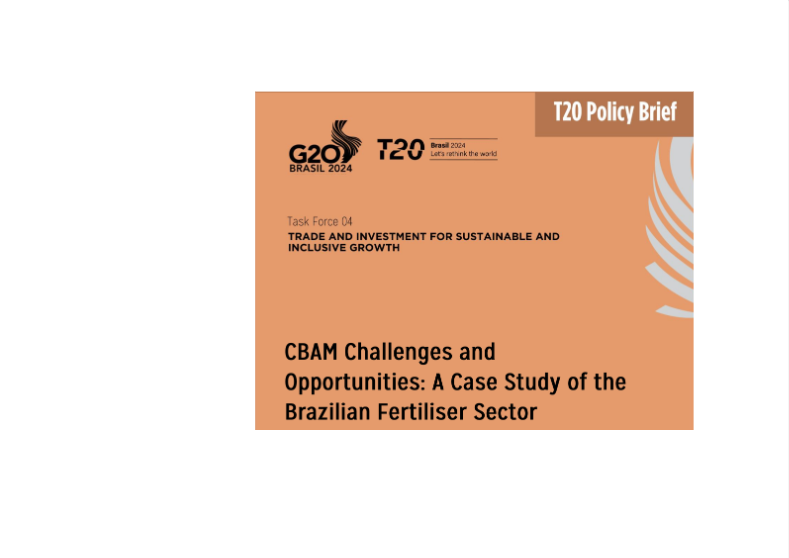
CBAM: Challenges and Opportunities: A Case Study of the Brazilian Fertiliser Sector | T20 – Think Tank Engagement Group – G20 Brazil’s Presidency 2024
October 17, 2024
Carbon pricing is one of the most effective instruments available to guide economies toward low-emission trajectories. Despite the increased introduction of this instrument, the International Monetary Fund (IMF) emphasises that carbon pricing poses several risks for carbon-intensive sectors. These risks are especially material for countries that do not yet have carbon pricing instruments in place. In this context, the implementation of the EU Carbon Border Adjustment Mechanism (CBAM), which started its first phase in October 2023, is a key initiative to observe. It covers the emission-intensive sectors of cement, aluminium, fertilisers, power energy production, iron and steel, and is designed to function in parallel with the EU’s Emissions Trading System (EU ETS), to mirror and complement its functioning on imported goods. For non-EU competitors that are not subject to the same environmental/climate standards and export to Europe, it is a major challenge. According to a study developed by the United Nations Conference on Trade and Development, G20 countries are among the most vulnerable to CBAM, including Russia, China, Turkey, India, Brazil, the US, etc. This policy brief sheds light on the Brazilian fertiliser sector as an example to assess
(i) the challenges and opportunities resulting from CBAM with a special focus on the promotion of social inclusion and food security, and
(ii) the specific opportunities and challenges for Brazilian SME’s in this sector and its supply chain.
The assessment results are discussed in terms of the relevance of the group of impacted G20 countries. Recommendations for action by the G20 group and the finance and sherpa tracks to increase climate-ambitious and positive distributional impacts of CBAM will be elaborated.
This T20 Policy Brief was elaborated in collaboration with gFIS – grupo Finanças e Investimentos Sustentáveis and ZEW – Leibniz-Zentrum für Europäische Wirtschaftsforschung.
You can read the Policy Brief below:
TF04_ST_01__CBAM_challenges_a66fe8b541a699.pdf (t20brasil.org).
Recommendations provided to the G20:
Specific policy recommendation for the Sherpa Track
- WG Agriculture:
Recommendation 1: Address biodiversity concerns and just-transition pathways towards green innovation in agriculture
Recommendation 2: Look at new business opportunities resulting from CBAM taxes
- WG Trade and Investment
Recommendation 1: Promote sustainability and inclusive growth on global trade policies and investments
Recommendation 2: Strengthen cooperation and “fair play” among nations
Specific policy recommendation for the Finance Track
- WG Sustainable Finance:
Recommendation 1: Advancing on taxonomies in support of carbon border taxes
Recommendation 2: Promote, enable and facilitate sustainable finance and investments – with the help of CBAM
- WG International Financial Architecture:
Recommendation 1: Advance on transparency and data
Recommendation 2: Support and strengthen task forces on disclosure frameworks and standards
What is the T20?
T20 is an official Engagement Group of the G20. It serves as an “idea bank” for the G20 by bringing together think tanks and high-level experts to discuss policy issues relevant to the G20. T20 recommendations are synthesised into policy briefs and presented to G20 working groups, ministerial meetings, and leaders’ summit. This helps the G20 deliver concrete policy measures.
What is the Task Force 4: Trade and investment for sustainable and inclusive growth
Task Force 04 (TF04) is dedicated to leveraging trade and investment mechanisms to achieve the Sustainable Development Goals (SDGs) outlined in the 2030 Agenda. To learn more about this Task Force, click here.
